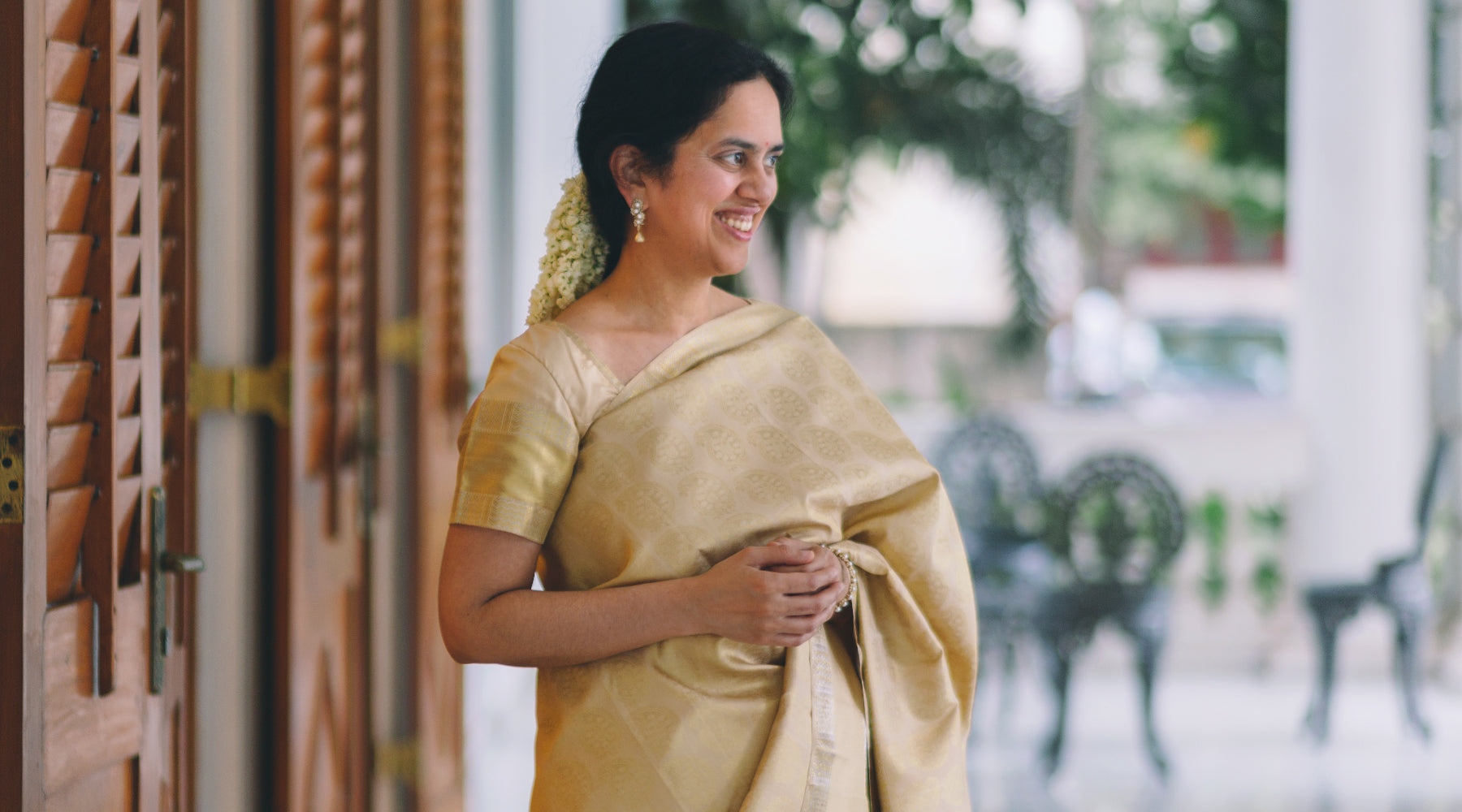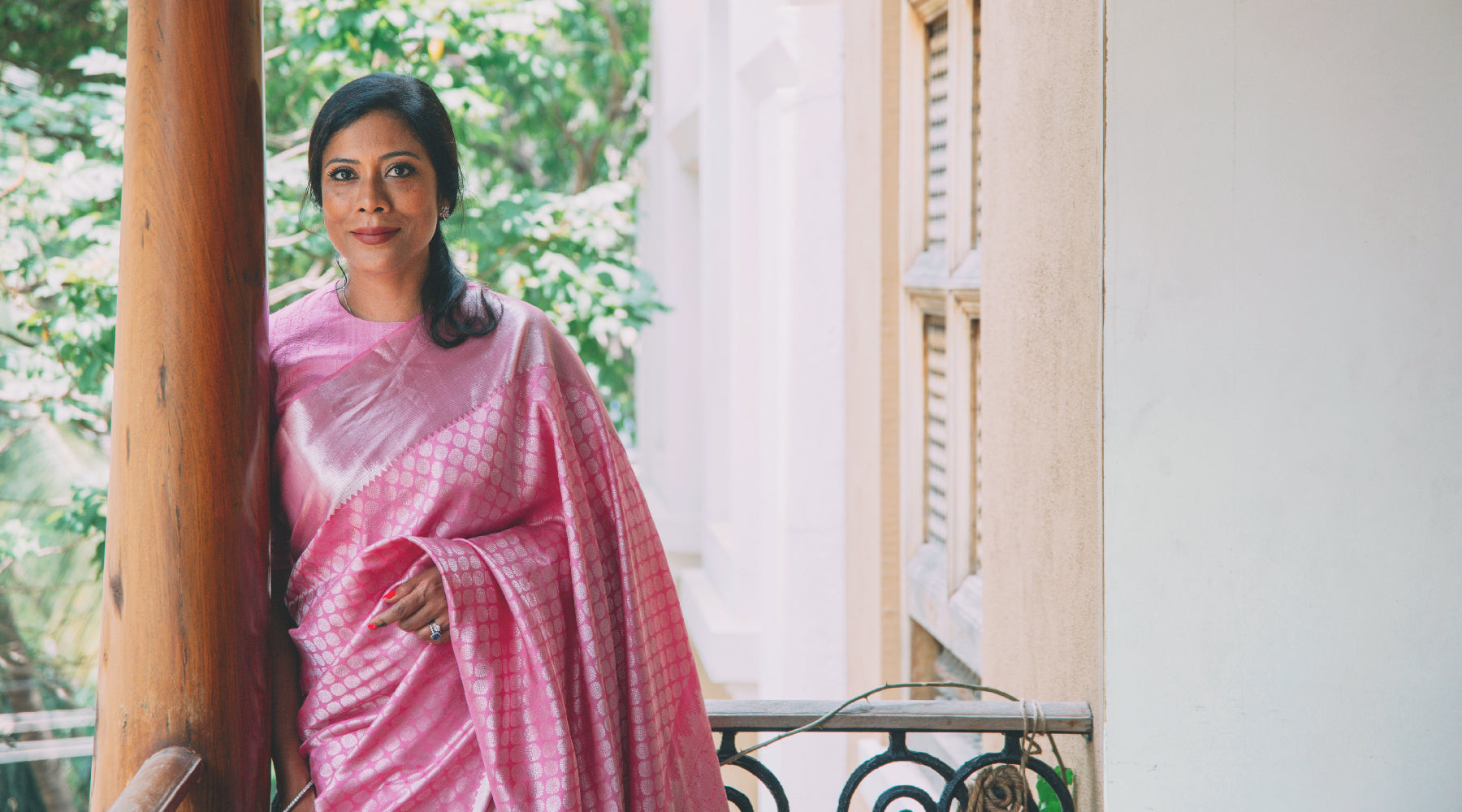KANAKAVALLI VIGNETTES : Dr. Shanthi Sanjay - A Fine Balance

As a child, Dr. Shanthi Sanjay was fascinated by the magical, healing touch of doctors and, while pursuing a career in medicine, she stumbled upon gynaecology. She is now passionate about guiding new mothers through the journey of pregnancy and taking care of two lives. In conversation with Aneesha Bangera of the Kanakavalli Journal, Dr. Shanti speaks about her firm belief in living a life of balance; juggling work and play as she finds time to talk patients through their many struggles, to play basketball with her daughter, and to look after her home. Having spent most of her life in a sari since the early 1980s, Dr. Shanthi finds joy in draping a kanjivaram, and believes it is a garment like no other. Finding time on a busy day to browse through www.kanakavalli.com, she curates a selection of fine kanjivarams that epitomise her quiet conviction and joyful spirit.
A Fine Balance
How did you come to the field of medicine?
There were no doctors in our family, until my generation. I had always thought that there was something magical about the medical profession; the healing touch of doctors and nurses. Once I actually began the study of medicine, I was absolutely fascinated by the human body. I never really wanted to become a gynaecologist; I wanted to get into the field of surgery, to engage my love for the complex intricacies of the human body. I went to interview with Dr. Arjun Rajagopal, but he was held up somewhere and I met his wife instead. Dr. Gita Arjun is a well-known gynaecologist in Chennai, and asked me to work with her. I wasn’t too keen at first; but she told me to just give it a week to see if I liked it. I’m not sure what exactly happened in that one week, but it changed the course of my career. I trained in obstetrics, and taking care of not one, but two lives, and watching life bloom – that has really become my passion.
Tell us a little bit about the role that music plays in your life as a doctor.
Music is a form of art, and I believe that art always complements therapy. Creativity and creation can heal, and this is why we have so many forms of art therapy. Music has always soothed me immensely and has been very important in my life and career. I always had music playing, whether I was studying or falling asleep. I trained in Carnatic music for some time, and I used to sing right up to my third year of college, after which I just didn't have the time. I tried to pick it up again when my daughter was small, but making time is always a challenge. We do always have music in our home, even today. Music really keeps the balance in my life; even in the labour room and operation theatre. I let my patients bring their own music so that while they’re in labour, they can listen to what they want to. I also allow husbands – the fathers to be – into the OT, and it’s always so lovely to see the songs they’ve chosen; something truly apt for the momentous occasion.
We’ve heard you have a keen interest in cooking and love to keep home. How do you balance these interests with your work at the clinic?
My mother is a role model in every way. She was a teacher until my younger sister was born, after which she was a homemaker, with a very rich life of hobbies. She was from Kerala and was a dancer, so we were exposed to Mohiniyattam very early in life. I was always amazed at the way she balanced all her passions – looking after the house, cooking, keeping in touch with and meeting a huge network of friends, and raising three children. She’s almost 80 and she still cooks almost every day! She is such a vivacious person. While juggling all of this she also kept in touch with theatre – she was an actor – and music. She has been such an inspiration to me. Despite long hours of work and unpredictable hours, I try my best to balance all the things that are important to me. I love keeping home; it is a place for me to relax with my family, to welcome friends. I think it is very important to maintain a balance, and for me that means making sure I have time to cook, look after my home, and spend time with my daughter and my pet dog, Patch, who is like a second child to me.

You used to play basketball regularly… How do you keep up with the sport and physical fitness these days?
Before my daughter Shreya was born, a group of friends and I would play basketball every Sunday. It was a wonderful way of keeping in touch with the sport, meeting friends and staying fit. We would go out for breakfast after our games and catch up on each other’s lives. Before that, when I was studying in WCC just before my admission into medical school, I played on the hockey and basketball teams, and Stella was our arch rival! I now enjoy playing with my daughter and her friends. I try to keep two evenings a week free to spend time with her, and we play basketball in our apartment complex. Besides that, I make time every day for some yoga. I think outdoor and physical activities are extremely important, even if it’s just going for a short walk or playing a sport. Despite being called on at all odd hours for deliveries, I have managed to make time for this and I feel very lucky. Sometimes, it doesn’t even have to be physical exercise, but an activity that gets us away from our desks or out of the house or office. It’s important to unwind, to do something different from our everyday mundane tasks. I love visiting the grocery store, or taking a walk with friends – simple and easy ways of taking a break. I find that even in my profession, it’s often not the medicines that make the biggest difference, but a little bit of TLC that really makes patients happy and relaxed. Similarly, everyone needs to take time out to do something that gives them joy, and makes them feel relaxed.
As a gynaecologist, working in the field of women’s health, what brings you the greatest joy and what are the biggest challenges you face?
The biggest challenge, of course, is delivering that baby. It is being responsible for two lives; and taking someone through a journey of almost ten months that will change their lives forever. They come in as a single unit, and leave as two individuals – it’s challenging, of course, but also fascinating, and something that brings me great joy. It is so much more than a physiological process, and often I’m offering psychological and even moral support. The other challenge I face is working with patients who are unable to have children. It used to leave me disheartened sometimes, as it’s something I have been through myself – my husband and I had our daughter after 13 years of being married. But I have realised that being there for patients at this difficult time is most important, it is my duty as a doctor. I try to offer hope, to help them find happiness even in their difficulties. I take a lot of time with each patient, and sometimes my clinic hours get extended because of this; but at the end of the day I feel deeply satisfied. I think it’s absolutely important for a patient and doctor to enjoy each other, to get along. And to be able to make someone feel better – not just physically, but emotionally as well – gives me such joy. Often, people who are ill or elderly just want someone to listen. They come to me to share their woes, to pour their hearts out, looking for a safe space and someone who will give them hope and motivation. The satisfaction I get from trying to offer them some support is the most rewarding part of my job.
Do you wear a lot of saris? What does the sari – and the kanjivaram in particular – mean to you?
I am a very traditional person. As broad minded as I might seem, deep down I’m quite traditional and I like my kanjivarams – the ones I grew up seeing my mother wearing. In the 1980s, when I started college, we were told that if we didn’t wear saris, our academic grades could be affected. I’m not sure if this is true, but I was happy to be in a sari and since then, I have lived in a sari. Only much later did I sometimes try wearing churidars or trousers, but I still love the sari. The kanjivaram in particular, is so traditional and so lovely. I can’t help but feel happy when I wear a kanjivaram, and when one feels happy, it shows. I think that’s why everyone looks so lovely at a wedding – because nobody can feel sad in a kanjivaram! Often, if I’m feeling a bit down, I wear a beautiful kanjivaram to feel better.
What’s the story behind the Kanakavalli kanjivaram you chose to wear for Vignettes?
I had seen a pair of beautiful jhumkis on the online store, and visited Kingsley to buy them. I absolutely loved the beautiful space – I've always felt that ambience is so important in a store. I saw the earrings, and loved them, but thought I would come back for them. I’m not an impulsive person when it comes to buying jewellery, so even on the second visit I didn’t buy the earrings. The third time I went, the earrings had gone. I was so upset, and my daughter suggested we look at the kanjivarams to console me. We went in and I fell in love. There is so much choice, but every sari is so lovely that you’re choosing from the best of the best. I saw the Molten collection and bought a beautiful copper and pink kanjivaram. I also looked for, and found, a traditional black and arakku sari. I really splurged that day - buying two kanjivarams! But I love both of them, and I’m convinced that the sari is one of the loveliest garments.

Dr. Shanthi Sanjay is wearing a kanjivaram from our limited edition Molten collective - a light copper sari shot with pale pink, with a zari seeprekku pattern on the border and a broad band of zari on the pallu.
- Dr. Shanthi Sanjay in conversation with Aneesha Bangera
Explore Shanthi's Kanakavalli curation here



